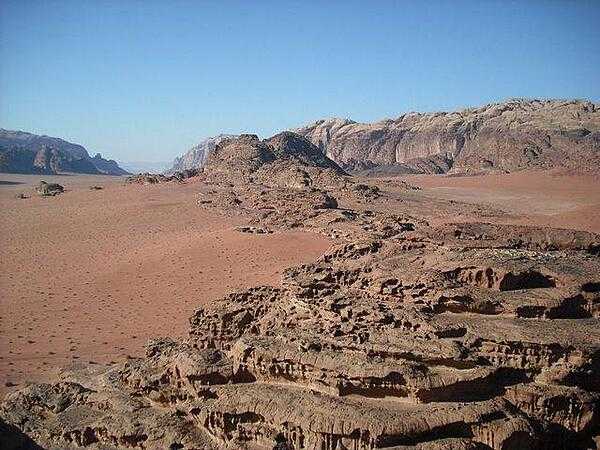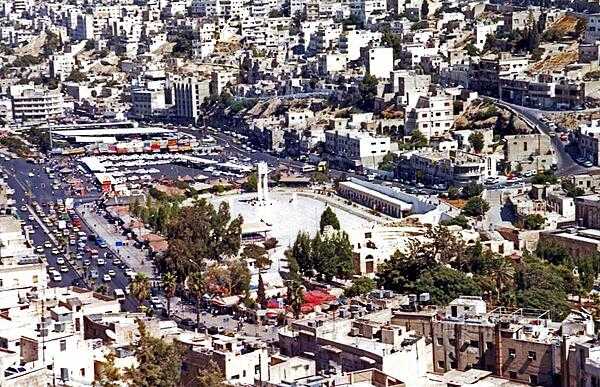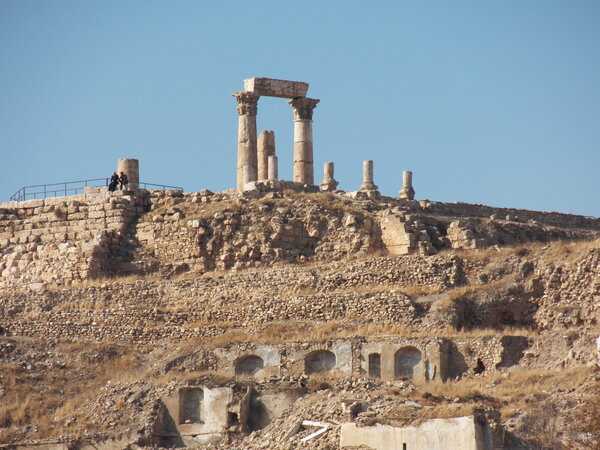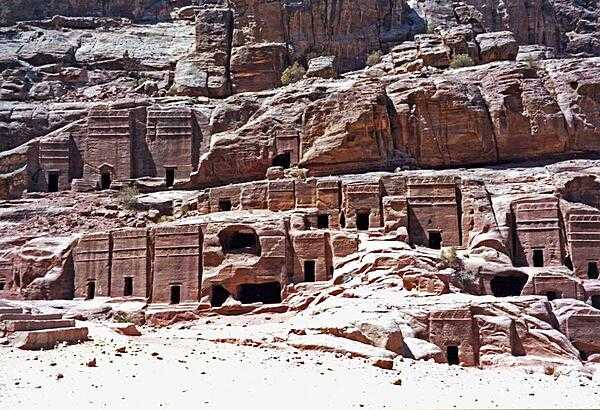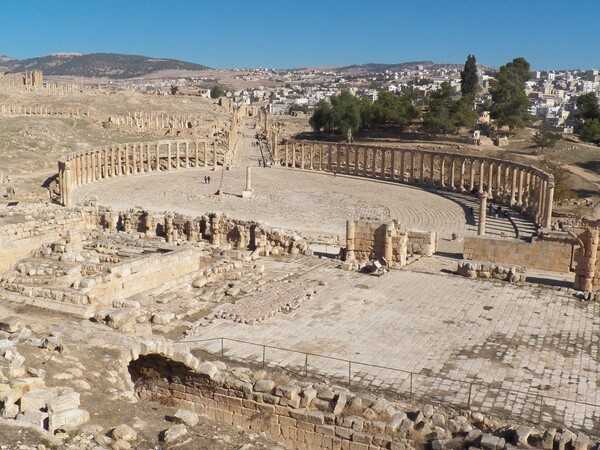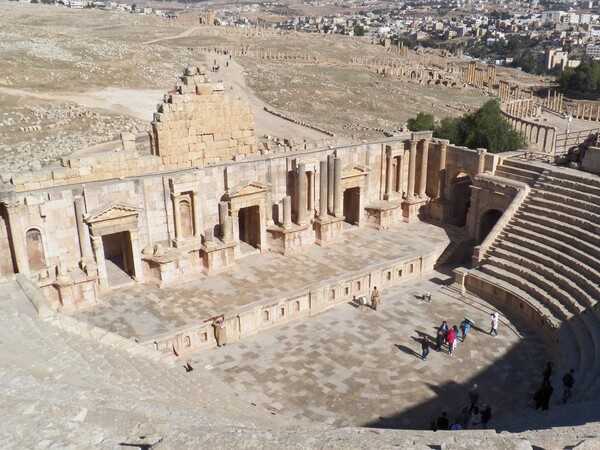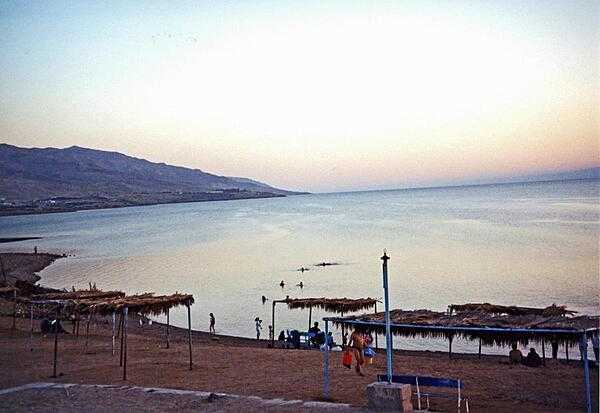Jordan - JO - JOR - JOR - Middle East
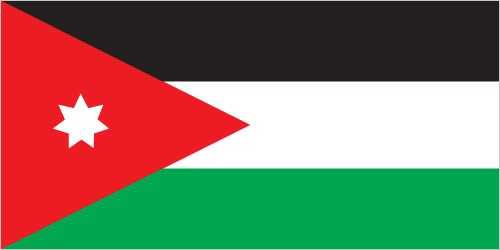
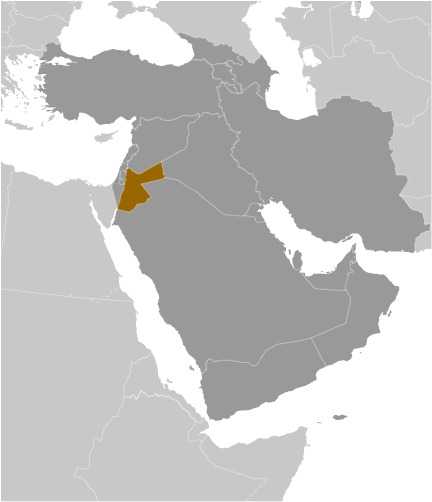
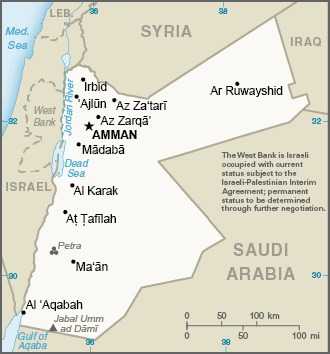
Jordan Images
Jordan Factbook Data
Diplomatic representation from the US
embassy: Abdoun, Al-Umawyeen St., Amman
mailing address: 6050 Amman Place, Washington DC 20521-6050
telephone: [962] (6) 590-6000
FAX: [962] (6) 592-0163
email address and website:
Amman-ACS@state.gov
https://jo.usembassy.gov/
Age structure
15-64 years: 64.9% (male 3,844,575/female 3,409,164)
65 years and over: 4.2% (2024 est.) (male 228,564/female 241,703)
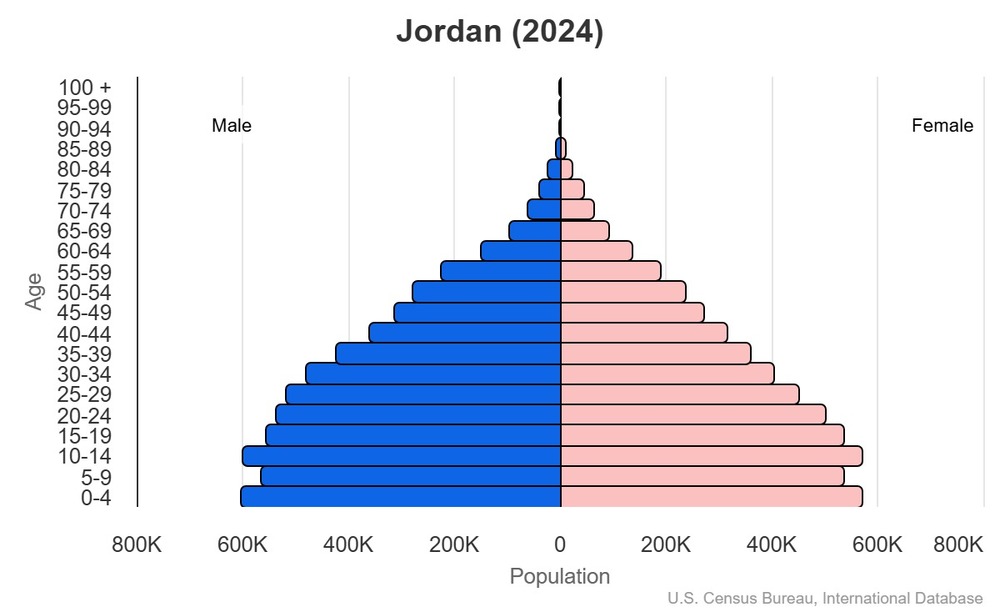
For additional information, please see the entry for Population pyramid on the Definitions and Notes page.
Geographic coordinates
Sex ratio
0-14 years: 1.06 male(s)/female
15-64 years: 1.13 male(s)/female
65 years and over: 0.95 male(s)/female
total population: 1.1 male(s)/female (2024 est.)
Natural hazards
Area - comparative
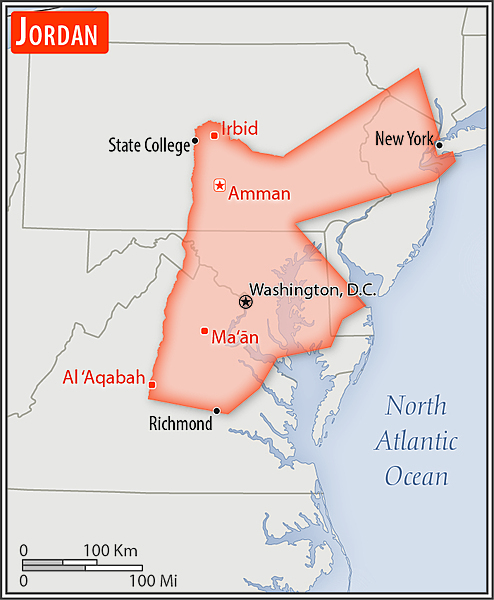
about three-quarters the size of Pennsylvania; slightly smaller than Indiana
Military service age and obligation
Background
After World War I and the dissolution of the Ottoman Empire, the League of Nations awarded Britain the mandate to govern much of the Middle East. In 1921, Britain demarcated from Palestine a semi-autonomous region of Transjordan and recognized ABDALLAH I from the Hashemite family as the country's first leader. The Hashemites also controlled the Hijaz, or the western coastal area of modern-day Saudi Arabia, until 1925, when IBN SAUD and Wahhabi tribes pushed them out. The country gained its independence in 1946 and thereafter became the Hashemite Kingdom of Jordan.
The country has had four kings. Long-time ruler King HUSSEIN (r. 1953-99) successfully navigated competing pressures from the major powers (US, UK, and Soviet Union), various Arab states, Israel, and Palestinian militants, the latter of which led to a brief civil war in 1970 that is known as "Black September" and ended in King HUSSEIN ousting the militants.Jordan's borders have changed since it gained independence. In 1948, Jordan took control of the West Bank and East Jerusalem in the first Arab-Israeli War, eventually annexing those territories in 1950 and granting its new Palestinian residents Jordanian citizenship. In 1967, Jordan lost the West Bank and East Jerusalem to Israel in the Six-Day War but retained administrative claims to the West Bank until 1988, when King HUSSEIN permanently relinquished Jordanian claims to the West Bank in favor of the Palestine Liberation Organization (PLO). King HUSSEIN signed a peace treaty with Israel in 1994, after Israel and the PLO signed the Oslo Accords in 1993.
Jordanian kings continue to claim custodianship of the Muslim holy sites in Jerusalem by virtue of their Hashemite heritage as descendants of the Prophet Mohammad and agreements with Israel and Jerusalem-based religious and Palestinian leaders. After Israel captured East Jerusalem in the 1967 War, it authorized the Jordanian-controlled Islamic Trust, or Waqf, to continue administering the Al Haram ash Sharif/Temple Mount holy compound, and the Jordan-Israel peace treaty reaffirmed Jordan's "special role" in administering the Muslim holy shrines in Jerusalem. Jordanian kings claim custodianship of the Christian sites in Jerusalem on the basis of the 7th-century Pact of Omar, when the Muslim leader, after conquering Jerusalem, agreed to permit Christian worship.
King HUSSEIN died in 1999 and was succeeded by his eldest son and current King ABDALLAH II. In 2009, ABDALLAH II designated his son HUSSEIN as the Crown Prince. During his reign, ABDALLAH II has contended with a series of challenges, including the Arab Spring influx of refugees from neighboring states, the COVID-19 pandemic, the effects of the war in Ukraine, a perennially weak economy, and the Israel-HAMAS conflict that began in October 2023.
Environmental issues
International environmental agreements
signed, but not ratified: none of the selected agreements
Military expenditures
4.5% of GDP (2023 est.)
4.8% of GDP (2022 est.)
5% of GDP (2021 est.)
5% of GDP (2020 est.)
Population below poverty line
note: % of population with income below national poverty line
Exports - commodities
note: top five export commodities based on value in dollars
Exports - partners
note: top five export partners based on percentage share of exports
Administrative divisions
Agricultural products
note: top ten agricultural products based on tonnage
Military and security forces
Ministry of Interior: Public Security Directorate (includes national police, the Gendarmerie, and the Civil Defense Directorate) (2025)
Budget
expenditures: $17.159 billion (2023 est.)
note: central government revenues and expenditures (excluding grants and social security funds) converted to US dollars at average official exchange rate for year indicated
Capital
geographic coordinates: 31 57 N, 35 56 E
time difference: UTC+3 (8 hours ahead of Washington, DC, during Standard Time)
etymology: in the 13th century B.C., the Ammonites named their primary city Rabbath Ammon; rabbath meant "capital," so the name translated as "The Capital of [the] Ammon[ites];" over time, the name was shortened to Ammon, and then to Amman
Imports - commodities
note: top five import commodities based on value in dollars
Climate
Coastline
Constitution
amendment process: constitutional amendments require at least a two-thirds majority vote of both the Senate and the House and ratification by the king
Exchange rates
Exchange rates:
0.71 (2024 est.)
0.71 (2023 est.)
0.71 (2022 est.)
0.71 (2021 est.)
0.71 (2020 est.)
Executive branch
head of government: Prime Minister Jafar HASSAN (since 15 September 2024)
cabinet: Cabinet appointed by the monarch in consultation with the prime minister
election/appointment process: prime minister appointed by the monarch
Flag
meaning: black stands for the Abbassid Caliphate, white for the Ummayyad Caliphate, and green for the Fatimid Caliphate; the triangle stands for the Great Arab Revolt of 1916, and the star's points for the seven verses of the opening Sura (Al-Fatiha) of the Quran, as well as faith in One God, humanity, national spirit, humility, social justice, virtue, and aspirations
history: the design is based on the Arab Revolt flag of World War I
Independence
Industries
Judicial branch
judge selection and term of office: Supreme Court chief justice appointed by the king; other judges nominated by the Judicial Council, an 11-member judicial policymaking body consisting of high-level judicial officials and judges, and approved by the king; judge tenure not limited; Constitutional Court members appointed by the king for 6-year non-renewable terms with one third of the membership renewed every 2 years
subordinate courts: Courts of Appeal; Great Felonies Court; religious courts; military courts; juvenile courts; Land Settlement Courts; Income Tax Court; Higher Administrative Court; Customs Court; special courts including the State Security Court
Land boundaries
border countries (5): Iraq 179 km; Israel 307 km; Saudi Arabia 731 km; Syria 379 km; West Bank 148 km
Land use
arable land: 2.3% (2023 est.)
permanent crops: 0.9% (2023 est.)
permanent pasture: 8.4% (2023 est.)
forest: 0.8% (2023 est.)
other: 87.7% (2023 est.)
Legal system
Legislative branch
legislative structure: bicameral
Literacy
male: 97.5% (2023 est.)
female: 92.3% (2023 est.)
Maritime claims
International organization participation
National holiday
Nationality
adjective: Jordanian
Natural resources
Geography - note
Economic overview
upper-middle-income Middle Eastern economy; high debt and unemployment, especially for youth and women; global events triggering trade slump and decreased revenue from tourism; growing manufacturing and agricultural sectors; key US foreign assistance recipient; natural-resource-poor and import-reliant
Political parties
Blessed Land Party
Building and Labor Coalition
Eradah Party
Growth Party
Islamic Action Front or IAF
Jordanian al-Ansar Party
Jordanian al-Ghad Party
Jordanian Arab Socialist Ba'ath Party or JASBP
Jordanian Civil Democratic Party
Jordanian Communist Party or JCP
Jordanian Equality Party
Jordanian Democratic People's Party or HASD
Jordanian Democratic Popular Unity Party or JDPUP/Wihda
Jordanian Democratic Unionist Party
Jordanian Flame Party
Jordanian Future and Life Party
Jordanian Model Party
Jordanian National Integration Party
Jordanian National Loyalty Party
Jordanian Reform and Renewal Party or Hassad
Jordanian Shura Party
Jordanian Social Democratic Party or JSDP
Justice and Reform Party or JRP
Labor Party
National Charter Party
National Coalition Party
National Constitutional Party
National Current Party or NCP
National Islamic Party
National Union
Nationalist Movement Party or Hsq
New Path Party
Progress Party
Railways
narrow gauge: 509 km (2014) 1.050-m gauge
Suffrage
Terrain
Government type
Country name
conventional short form: Jordan
local long form: Al Mamlakah al Urduniyah al Hashimiyah
local short form: Al Urdun
former: Transjordan
etymology: named for the Jordan River, which makes up part of Jordan's northwest border; the origin of the river's name is unclear, but it may come from a local word meaning "river"
Location
Map references
Irrigated land
Diplomatic representation in the US
chancery: 3504 International Drive NW, Washington, DC 20008
telephone: [1] (202) 966-2664
FAX: [1] (202) 966-3110
email address and website:
hkjconsular@jordanembassyus.org
http://www.jordanembassyus.org/
Internet users
Internet country code
Refugees and internally displaced persons
stateless persons: 17 (2024 est.)
GDP (official exchange rate)
note: data in current dollars at official exchange rate
Total renewable water resources
School life expectancy (primary to tertiary education)
male: 13 years (2023 est.)
female: 14 years (2023 est.)
Urbanization
rate of urbanization: 0.98% annual rate of change (2020-25 est.)
Broadcast media
Drinking water source
urban: 99.1% of population (2022 est.)
rural: 97% of population (2022 est.)
total: 99% of population (2022 est.)
unimproved:
urban: 0.9% of population (2022 est.)
rural: 3% of population (2022 est.)
total: 1% of population (2022 est.)
National anthem(s)
lyrics/music: Abdul-Mone'm al-RIFAI'/Abdul-Qader al-TANEER
history: adopted 1946; the shortened version of the anthem is most commonly used; the full version is reserved for special occasions
Major urban areas - population
International law organization participation
Physician density
Hospital bed density
National symbol(s)
Mother's mean age at first birth
note: data represents median age at first birth among women 25-49
GDP - composition, by end use
government consumption: 15.8% (2021 est.)
investment in fixed capital: 22.2% (2021 est.)
investment in inventories: 3% (2021 est.)
exports of goods and services: 30% (2021 est.)
imports of goods and services: -50.4% (2021 est.)
note: figures may not total 100% due to rounding or gaps in data collection
Citizenship
citizenship by descent only: the father must be a citizen of Jordan
dual citizenship recognized: yes
residency requirement for naturalization: 15 years
Population distribution
Electricity access
electrification - urban areas: 100%
electrification - rural areas: 98.9%
Civil aircraft registration country code prefix
Sanitation facility access
urban: 98.9% of population (2022 est.)
rural: 97.9% of population (2022 est.)
total: 98.8% of population (2022 est.)
unimproved:
urban: 1.1% of population (2022 est.)
rural: 2.1% of population (2022 est.)
total: 1.2% of population (2022 est.)
Ethnic groups
note: data represent population by self-identified nationality in national census
Religions
Languages
major-language sample(s):
كتاب حقائق العالم، المصدر الذي لا يمكن الاستغناء عنه للمعلومات الأساسية (Arabic)
The World Factbook, the indispensable source for basic information.
Imports - partners
note: top five import partners based on percentage share of imports
Elevation
lowest point: Dead Sea -431 m
mean elevation: 812 m
Health expenditure
7.6% of national budget (2022 est.)
Military - note
the US is a key security partner, and Jordan is one of the largest recipients of US military aid in the region; it cooperates with the US on a number of issues, including border security, arms transfers, cybersecurity, and counterterrorism; Jordan has Major Non-NATO Ally status with the US, a designation under US law that provides foreign partners with certain benefits in the areas of defense trade and security cooperation (2025)
Military and security service personnel strengths
Military equipment inventories and acquisitions
Terrorist group(s)
note: details about the history, aims, leadership, organization, areas of operation, tactics, targets, weapons, size, and sources of support of the group(s) appear(s) in the Terrorism reference guide
Military deployments
Total water withdrawal
industrial: 36.88 million cubic meters (2022 est.)
agricultural: 570.61 million cubic meters (2022 est.)
Waste and recycling
percent of municipal solid waste recycled: 14.6% (2022 est.)
Average household expenditures
on alcohol and tobacco: 4.5% of household expenditures (2023 est.)
Major aquifers
Major watersheds (area sq km)
Major lakes (area sq km)
note - endorheic hypersaline lake; 9.6 times saltier than the ocean; lake shore is 431 meters below sea level
National heritage
selected World Heritage Site locales: Petra (c); Quseir Amra (c); Um er-Rasas (Kastrom Mefa'a) (c); Wadi Rum Protected Area (m); Baptism Site “Bethany Beyond the Jordan” (Al-Maghtas) (c); As-Salt - The Place of Tolerance and Urban Hospitality (c); Umm Al-Jimāl (c)
Child marriage
women married by age 18: 9.7% (2018)
men married by age 18: 0.1% (2018)
Coal
imports: 110,000 metric tons (2023 est.)
Electricity generation sources
solar: 15.3% of total installed capacity (2023 est.)
wind: 7.7% of total installed capacity (2023 est.)
hydroelectricity: 0.1% of total installed capacity (2023 est.)
Natural gas
consumption: 5.441 billion cubic meters (2023 est.)
exports: 375.998 million cubic meters (2018 est.)
imports: 4.865 billion cubic meters (2023 est.)
proven reserves: 6.031 billion cubic meters (2021 est.)
Petroleum
refined petroleum consumption: 97,000 bbl/day (2023 est.)
crude oil estimated reserves: 1 million barrels (2021 est.)
Gross reproduction rate
Currently married women (ages 15-49)
Remittances
10.1% of GDP (2022 est.)
11% of GDP (2021 est.)
note: personal transfers and compensation between resident and non-resident individuals/households/entities
Ports
large: 0
medium: 0
small: 0
very small: 1
ports with oil terminals: 1
key ports: Al Aqabah
Legislative branch - lower chamber
number of seats: 138 (all directly elected)
electoral system: mixed system
scope of elections: full renewal
term in office: 4 years
most recent election date: 9/10/2024
percentage of women in chamber: 19.6%
expected date of next election: September 2028
note: the total number of Chamber of Deputies' seats increased to 138 from 130 for the September 2024 election
Legislative branch - upper chamber
number of seats: 69 (all appointed)
scope of elections: full renewal
term in office: 4 years
most recent election date: 10/24/2024
percentage of women in chamber: 14.5%
expected date of next election: October 2028
National color(s)
Particulate matter emissions
Methane emissions
agriculture: 25.4 kt (2019-2021 est.)
waste: 188.2 kt (2019-2021 est.)
other: 0.6 kt (2019-2021 est.)
Labor force
note: number of people ages 15 or older who are employed or seeking work
Youth unemployment rate (ages 15-24)
male: 39.8% (2024 est.)
female: 49.2% (2024 est.)
note: % of labor force ages 15-24 seeking employment
Net migration rate
Median age
male: 25.5 years
female: 24.4 years
Debt - external
note: present value of external debt in current US dollars
Maternal mortality ratio
Reserves of foreign exchange and gold
$19.069 billion (2023 est.)
$18.198 billion (2022 est.)
note: holdings of gold (year-end prices)/foreign exchange/special drawing rights in current dollars
Public debt
note: central government debt as a % of GDP
Total fertility rate
Unemployment rate
18% (2023 est.)
18.2% (2022 est.)
note: % of labor force seeking employment
Carbon dioxide emissions
from coal and metallurgical coke: 627,000 metric tonnes of CO2 (2023 est.)
from petroleum and other liquids: 13.264 million metric tonnes of CO2 (2023 est.)
from consumed natural gas: 8.544 million metric tonnes of CO2 (2023 est.)
Area
land: 88,802 sq km
water: 540 sq km
Taxes and other revenues
note: central government tax revenue as a % of GDP
Real GDP (purchasing power parity)
$107.315 billion (2023 est.)
$104.307 billion (2022 est.)
note: data in 2021 dollars
Airports
Infant mortality rate
male: 14.3 deaths/1,000 live births
female: 12.1 deaths/1,000 live births
Inflation rate (consumer prices)
2.1% (2023 est.)
4.2% (2022 est.)
note: annual % change based on consumer prices
Current account balance
-$3.815 billion (2022 est.)
-$3.718 billion (2021 est.)
note: balance of payments - net trade and primary/secondary income in current dollars
Real GDP per capita
$9,400 (2023 est.)
$9,300 (2022 est.)
note: data in 2021 dollars
Broadband - fixed subscriptions
subscriptions per 100 inhabitants: 7 (2023 est.)
Tobacco use
male: 58.6% (2025 est.)
female: 13.9% (2025 est.)
Obesity - adult prevalence rate
Energy consumption per capita
Death rate
Birth rate
Electricity
consumption: 20.31 billion kWh (2023 est.)
exports: 162.93 million kWh (2023 est.)
imports: 383.073 million kWh (2023 est.)
transmission/distribution losses: 2.472 billion kWh (2023 est.)
Merchant marine
by type: general cargo 5, other 29
Children under the age of 5 years underweight
Imports
$30.019 billion (2022 est.)
$23.321 billion (2021 est.)
note: balance of payments - imports of goods and services in current dollars
Exports
$20.743 billion (2022 est.)
$13.87 billion (2021 est.)
note: balance of payments - exports of goods and services in current dollars
Heliports
Alcohol consumption per capita
beer: 0.06 liters of pure alcohol (2019 est.)
wine: 0 liters of pure alcohol (2019 est.)
spirits: 0.19 liters of pure alcohol (2019 est.)
other alcohols: 0 liters of pure alcohol (2019 est.)
Life expectancy at birth
male: 75 years
female: 78.1 years
Real GDP growth rate
2.9% (2023 est.)
2.6% (2022 est.)
note: annual GDP % growth based on constant local currency
Industrial production growth rate
note: annual % change in industrial value added based on constant local currency
GDP - composition, by sector of origin
industry: 25.1% (2024 est.)
services: 60.4% (2024 est.)
note: figures may not total 100% due to non-allocated consumption not captured in sector-reported data
Education expenditure
11.7% national budget (2024 est.)
Population growth rate
Dependency ratios
youth dependency ratio: 46.6 (2025 est.)
elderly dependency ratio: 6.7 (2025 est.)
potential support ratio: 14.9 (2025 est.)
Population
male: 5,908,853
female: 5,403,654
Telephones - mobile cellular
subscriptions per 100 inhabitants: 70 (2024 est.)
Telephones - fixed lines
subscriptions per 100 inhabitants: 4 (2024 est.)
